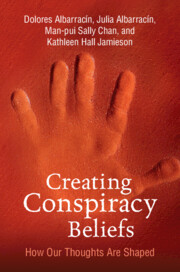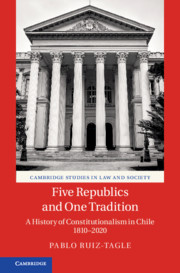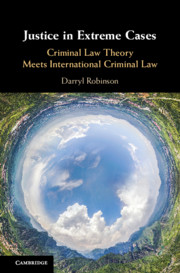Refine search
Actions for selected content:
38 results
Chapter 21 - The People, the Masses, and the Educated Elite; or, Democracy in the Age of the Internet
- from Part V - The People Now
-
-
- Book:
- 'The People' and British Literature
- Published online:
- 11 December 2025
- Print publication:
- 11 December 2025, pp 340-356
-
- Chapter
- Export citation
1 - The Emerging Crisis (to December 1964)
-
- Book:
- Waging Peace
- Published online:
- 03 November 2025
- Print publication:
- 13 November 2025, pp 8-38
-
- Chapter
- Export citation
Equality Law: A Structural Turn
-
- Journal:
- German Law Journal / Volume 26 / Issue 2 / March 2025
- Published online by Cambridge University Press:
- 01 September 2025, pp. 153-169
-
- Article
-
- You have access
- Open access
- HTML
- Export citation
6 - Unhappy in the Homeland
- from Part II - Kicking out the Turks
-
- Book:
- Foreign in Two Homelands
- Published online:
- 31 August 2024
- Print publication:
- 31 October 2024, pp 268-304
-
- Chapter
-
- You have access
- Open access
- HTML
- Export citation
The Liberal Case for Community Land Trusts
-
- Journal:
- Canadian Journal of Law & Jurisprudence / Volume 37 / Issue 2 / August 2024
- Published online by Cambridge University Press:
- 28 October 2024, pp. 427-456
-
- Article
-
- You have access
- Open access
- HTML
- Export citation
Chapter 2 - Liberalism
- from Part 1 - Theories of International Relations
-
-
- Book:
- An Introduction to International Relations
- Published online:
- 31 August 2024
- Print publication:
- 12 August 2024, pp 34-45
-
- Chapter
- Export citation
Chapter 21 - Religion and secularism
- from Part 4 - The new agenda: Globalisation and global challenges
-
-
- Book:
- An Introduction to International Relations
- Published online:
- 31 August 2024
- Print publication:
- 12 August 2024, pp 284-295
-
- Chapter
- Export citation
Chapter 14 - Security
- from Part 3 - The traditional agenda: States, wars and law
-
-
- Book:
- An Introduction to International Relations
- Published online:
- 31 August 2024
- Print publication:
- 12 August 2024, pp 195-206
-
- Chapter
- Export citation
Chapter 3 - Realism
- from Part 1 - Theories of International Relations
-
-
- Book:
- An Introduction to International Relations
- Published online:
- 31 August 2024
- Print publication:
- 12 August 2024, pp 46-57
-
- Chapter
- Export citation
1 - A Value-Neutral Understanding of Capacity
-
- Book:
- Values and Disorder in Mental Capacity Law
- Published online:
- 25 October 2024
- Print publication:
- 27 June 2024, pp 16-36
-
- Chapter
- Export citation
4 - Social Justice through Taxation?
-
-
- Book:
- Social Justice in Twentieth-Century Europe
- Published online:
- 29 February 2024
- Print publication:
- 07 March 2024, pp 78-95
-
- Chapter
- Export citation
Self-reported political ideology
-
- Journal:
- Political Science Research and Methods / Volume 13 / Issue 2 / April 2025
- Published online by Cambridge University Press:
- 22 February 2024, pp. 412-433
-
- Article
-
- You have access
- Open access
- HTML
- Export citation
10 - The Nature and Origins of Reciprocity Beliefs
-
- Book:
- Fair Enough?
- Published online:
- 07 September 2023
- Print publication:
- 21 September 2023, pp 220-241
-
- Chapter
- Export citation
The Risks and Benefits of National Stories
-
- Journal:
- Ethics & International Affairs / Volume 36 / Issue 4 / Winter 2022
- Published online by Cambridge University Press:
- 22 December 2022, pp. 413-425
-
- Article
-
- You have access
- Open access
- HTML
- Export citation
Chapter 1 - Introduction
-
- Book:
- Creating Conspiracy Beliefs
- Published online:
- 18 November 2021
- Print publication:
- 25 November 2021, pp 1-10
-
- Chapter
- Export citation

Creating Conspiracy Beliefs
- How Our Thoughts Are Shaped
-
- Published online:
- 18 November 2021
- Print publication:
- 25 November 2021

Five Republics and One Tradition
- A History of Constitutionalism in Chile 1810–2020
-
- Published online:
- 08 October 2021
- Print publication:
- 21 October 2021

Justice in Extreme Cases
- Criminal Law Theory Meets International Criminal Law
-
- Published online:
- 17 December 2020
- Print publication:
- 17 December 2020
1 - Introduction
- from Part I - Introduction and Problem
-
- Book:
- Justice in Extreme Cases
- Published online:
- 17 December 2020
- Print publication:
- 17 December 2020, pp 3-19
-
- Chapter
- Export citation
5 - Criminal Law Theory in Extremis
- from Part II - Proposed Solution: A Humanist, Coherentist, Deontic Account
-
- Book:
- Justice in Extreme Cases
- Published online:
- 17 December 2020
- Print publication:
- 17 December 2020, pp 119-138
-
- Chapter
- Export citation
